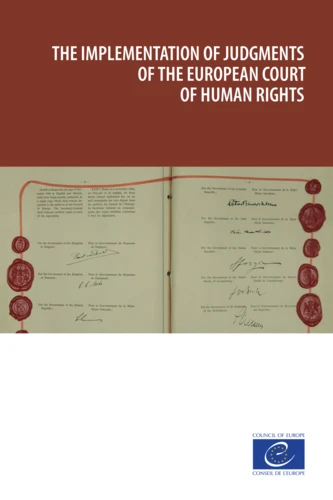The implementation of judgments of the European Court of Human Rights
Par :Formats :
Disponible dans votre compte client Decitre ou Furet du Nord dès validation de votre commande. Le format ePub est :
- Compatible avec une lecture sur My Vivlio (smartphone, tablette, ordinateur)
- Compatible avec une lecture sur liseuses Vivlio
- Pour les liseuses autres que Vivlio, vous devez utiliser le logiciel Adobe Digital Edition. Non compatible avec la lecture sur les liseuses Kindle, Remarkable et Sony
 , qui est-ce ?
, qui est-ce ?Notre partenaire de plateforme de lecture numérique où vous retrouverez l'ensemble de vos ebooks gratuitement
Pour en savoir plus sur nos ebooks, consultez notre aide en ligne ici
- FormatePub
- ISBN978-92-871-8586-0
- EAN9789287185860
- Date de parution17/01/2018
- Protection num.pas de protection
- Infos supplémentairesepub
- ÉditeurCouncil of Europe
- PréfacierPierre-Yves Le Borgn'
Résumé
Delays in implementing the Court's judgments, lack of political will in certain states parties, attempts to discredit the Court.
In ratifying the European Convention on Human Rights, the signatory states accept the Court's jurisdiction and authority and "undertake to abide by the final judgment of the Court in any case to which they are parties" (Article 46 of the Convention).
While certain member states have made real progress in implementing the judgments of the European Court of Human Rights, some others face serious structural and political problems forming real "pockets of resistance" that delay or prevent the execution of judgments.
The Committee of Ministers is still supervising the execution of some 10 000 judgments, although they are not all at the same stage of implementation. This publication highlights the difficulties in implementing certain judgments encountered in the 10 countries which have the highest number of non-implemented judgments against them (Italy, the Russian Federation, Turkey, Ukraine, Romania, Hungary, Greece, Bulgaria, the Republic of Moldova and Poland).
It also analyses judgments whose execution raises complex political issues.
The Committee of Ministers is still supervising the execution of some 10 000 judgments, although they are not all at the same stage of implementation. This publication highlights the difficulties in implementing certain judgments encountered in the 10 countries which have the highest number of non-implemented judgments against them (Italy, the Russian Federation, Turkey, Ukraine, Romania, Hungary, Greece, Bulgaria, the Republic of Moldova and Poland).
It also analyses judgments whose execution raises complex political issues.
Delays in implementing the Court's judgments, lack of political will in certain states parties, attempts to discredit the Court.
In ratifying the European Convention on Human Rights, the signatory states accept the Court's jurisdiction and authority and "undertake to abide by the final judgment of the Court in any case to which they are parties" (Article 46 of the Convention).
While certain member states have made real progress in implementing the judgments of the European Court of Human Rights, some others face serious structural and political problems forming real "pockets of resistance" that delay or prevent the execution of judgments.
The Committee of Ministers is still supervising the execution of some 10 000 judgments, although they are not all at the same stage of implementation. This publication highlights the difficulties in implementing certain judgments encountered in the 10 countries which have the highest number of non-implemented judgments against them (Italy, the Russian Federation, Turkey, Ukraine, Romania, Hungary, Greece, Bulgaria, the Republic of Moldova and Poland).
It also analyses judgments whose execution raises complex political issues.
The Committee of Ministers is still supervising the execution of some 10 000 judgments, although they are not all at the same stage of implementation. This publication highlights the difficulties in implementing certain judgments encountered in the 10 countries which have the highest number of non-implemented judgments against them (Italy, the Russian Federation, Turkey, Ukraine, Romania, Hungary, Greece, Bulgaria, the Republic of Moldova and Poland).
It also analyses judgments whose execution raises complex political issues.






















